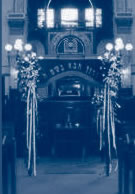|
SEDRA : Korach Rosh Chodesh Hertz Chumash
p. 639 Numbers Chap. 16
This week's Sedra is generously sponsored by Danny Jedwab.
SYNOPSIS:
The Sedra commences by describing the great rebellion against
Moses and Aaron. A group of Levites under the leadership of
Korach and a group from the tribe of Reuben under Datan, Aviram
and On ben Pelet together with 250 prominent members of the
community participated in the revolt. Korach contended that
he should have been appointed the Prince of the tribe of Levi.
Datan and Aviram claimed their rights to leadership based
on their descent from Reuben, Jacob's eldest son.
Responding to their challenge, Moses calls upon the rebels
to appear the next day to meet him. He warns the people to
stay clear of Korach and his assembly and announces the sign
which will indicate whom G-d has chosen as their legitimate
leader. If the rebels die a natural death, Moses would be
rejected, but if they are swallowed alive by the earth, this
would vindicate Moses as the true leader.
No sooner had Moses spoken than Korach, his followers and
their possessions were swallowed alive into the ground. The
remainder of the people dispersed in terror.
The people then began to murmur and held Moses responsible
for the death `of the people of G-d'. A plague spread quickly
among the people taking the lives of a great number of the
murmurers. When Aaron moved among the people with a pan of
incense, the plague subsided.
G-d then ordered the prince of each tribe to present his
staff at the Tent of Meeting. The staves, together with the
staff of Levi bearing the name of Aaron, were placed in the
Ark. On the morrow Aaron's rod was found to have miraculously
produced buds, blossoms and almonds. This indisputable sign
vindicated Aaron as G-d's chosen Kohen Gadol. The rod of Aaron
was to be kept in the Ark to indicate that the rights of the
Kohanim are to be preserved and never to be challenged.
The Priests and Levites were not allocated a specific portion
in the land of Israel, their work was the Service in the Temple.
It was the obligation of the nation to support them through
a system of contributions. The Kohanim received first fruits,
the redemption of the first born, the Terumah (a portion of
each persons produce the size of which was discretionary)
and various offerings. The Levites would receive the First
tithe out of which each Levite would have to set aside Terumah
for the Kohen.
SPECIAL MAPHTIR - SHABBAT ROSH CHODESH HERTZ CHUMASH P.
695 Numbers Chap. 28 verses 9 - 15 inc.
HAPHTORAH - FOR SHABBAT ROSH CHODESH HERTZ CHUMASH P.
944 Isaiah Chapter 66
The final chapter of Isaiah comprises the reading when Shabbat
and Rosh Chodesh coincide owing to its reference in the penultimate
verse to the continued and ever more popular observance of
Rosh Chodesh in the future.
The chapter combines fierce admonition for those who pervert
sincere observance, mock the ways of G-d and worship idolatry
while it also describes the rebirth of Israel and the ingathering
of exiles.
The penultimate verse referring to Rosh Chodesh is repeated
again after the conclusion of the Haphtorah.
TELL ME RABBI ..... HALLEL: HYMNS OF PRAISE WHEN HALLEL
IS SAID :
Six psalms (113 -118), collectively known as Hallel (Hymns
of Praise), are said immediately following the Shacharit Amidah
on Pesach, Shavuot, Succot, Channukah and on Rosh Chodesh.
The beauty of these Psalms remains unsurpassed. Not wanting
to leave G-d's praises to chance, the Sages made these psalms
a mitzvah for the festivals. Some regard Hallel on these festivals
as a Torah obligation.
Hymns of praise to G-d are to be said whenever we celebrate
events that commemorate the deliverance of our people from
dire peril (Pesahim 117a) e.g. on Channukah, the ruling of
the Israeli Chief Rabbinate for saying Hallel on Yom Ha'atzmaut
and Yom Yerushalayim.
The joyous mood and tempo of Hallel make it most appropriate
for festivals and for days of national rejoicing. Its music
reflects high spirits and exuberance: "This is the day
which the Lord G-d made, we will be glad and rejoice therein"
(Psalm 118).
HOW HALLEL IS SAID:
Hallel is preceded by the recitation of a blessing. Maimonides
ruled that since Hallel on Rosh Chodesh is only a custom one
omits the blessing as one does not recite a blessing over
a custom (Hil. Hanukkah 3:7).
This is adhered to by Sephardim but Ashkenazim do recite a
blessing even on Rosh Chodesh. It became customary also to
conclude Hallel with a blessing ending with, "...Blessed
art Thou, Lord, a King extolled in psalms of praise."
We stand when reciting Hallel because it is a testimony to
G-d's wondrous deeds and powers, and because testimony in
Jewish courts is always given while standing. Also, it is
in keeping with the verses: "Give praise, ye servants
to the Lord; you who stand in the house of the Lord"
(Psalms 135: 1-2).
BACK TO SHABBAT SHALOM
TABLE
|








